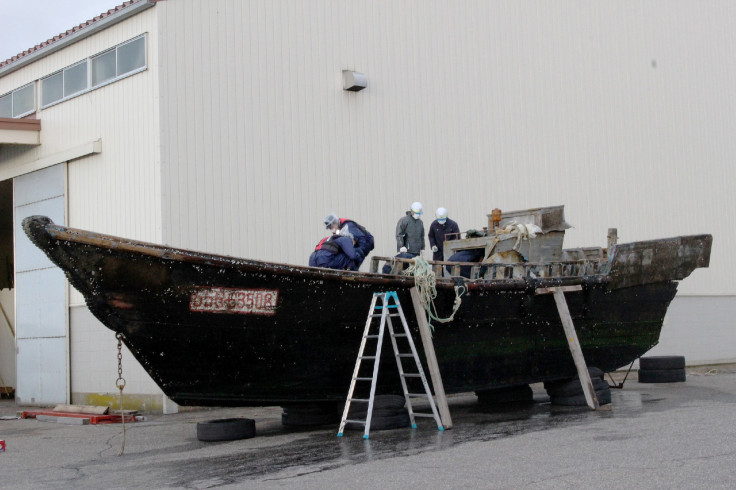'North Korean Ghost Ship' Found In Japan With Dead Body Inside

A presumed North Korean boat that contained a dead body washed ashore in Japan Tuesday morning. The incident follows a number of similar incidents in the past few months.
According to local authorities, the 35-foot vessel was found in central Japan, near Kashiwazaki City. The wooden boat had Korean characters on it and the dead man inside had a badge of North Korean founder Kim Il Sung. A second body was found less than half a mile away, though it is unclear if the second body is connected to the boat.
CNN reported that three other bodies were found Tuesday floating in the waters off of northern Japan in the city of Fukaura, located 300 miles north of Kashiwazaki City. Authorities are investigating if the three bodies are connected to the spate of dead bodies, mystery ships and North Korean sailors washing ashore in Japan.
Two bodies and two ships were discovered near Oga City on Dec. 7. Three days earlier, a ship with three bodies was found on the shore near Tsuruokashi, roughly 110 miles from Oga City.
Ten North Korean fishermen found in a boat drifting near Japan’s main northernmost island, Hokkaido, were detained on Nov. 28. The one day earlier, eight skeletal remains were discovered in a vessel in Akita prefecture.
The discovery of the so-called North Korean "ghost ships" could point to an increasingly desperate situation inside North Korea. After North Korea’s continued missile and nuclear weapons tests, the world has responded by saddling the authoritarian country with tight economic sanctions aimed at slowing progress of their arms testing. With North Korea launching its most advanced missile to date last month, an intercontinental ballistic missile likely capable of striking anywhere in the U.S., experts fear that sanctions are merely squeezing North Korea’s populace. The United Nations said this week that an estimated 70 percent of the county faced acute food shortage and that sanctions are complicating getting aid to the country.
“It's after Kim Jong Un decided to expand the fisheries industry as a way of increasing revenue for the military. They are using old boats manned by the military, by people who have no knowledge about fishing,” Satoru Miyamoto, a North Korean expert at Seigakuin University in Japan, told CNN.
In addition to amateur fisherman desperate to meet quotas for fear of retribution, the waters of the Sea of Japan, which separates Japan and North Korea, can be tough for even experienced sailors.
“[Sailors are] subject to great changes in [the] sea as well as weather conditions, and this constitutes a grave threat to navigation,” a Japanese Coast Guard warning noted.
© Copyright IBTimes 2025. All rights reserved.





















